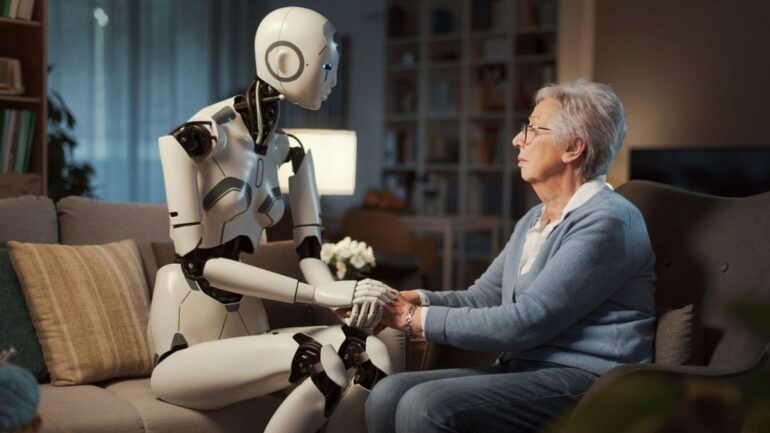TL;DR:
- Companion robots with AI offer a potential remedy for the loneliness epidemic.
- Ethical guidelines must be developed to ensure the trustworthiness of companion robots.
- Loneliness and social isolation pose serious health risks and affect a significant portion of the global population.
- Companion robots can reduce stress, combat loneliness, and promote overall well-being.
- Advanced AI enables companion robots to engage in more genuine social connections.
- Medical professionals support the use of companion robots as a means of providing companionship and improving mental health.
- Measurement of a robot’s impact is challenging but essential for evaluating effectiveness.
- The “Companion Robot Impact Scale” (Co-Bot-I-7) aims to measure physical health and loneliness.
- Companion robots have the potential to contribute to a healthier society.
Main AI News:
Recent research conducted by Auckland, Duke, and Cornell Universities highlights the potential of companion robots equipped with artificial intelligence (AI) to alleviate the widespread issue of loneliness. This report, featured in the July 12 edition of Science Robotics, delves into the ethical considerations surrounding these robots and emphasizes the need for collaboration among governments, policymakers, technologists, and clinicians to swiftly develop guidelines regarding trust, agency, engagement, and real-world efficacy.
One key aspect discussed in the report is the measurement of a companion robot’s impact on individuals. Murali Doraiswamy, MBBS, FRCP, a professor of Psychiatry and Geriatrics at Duke University and a member of the Duke Institute for Brain Sciences, suggests that while having a genuine human friend is currently the optimal solution, society must prioritize social connectedness and eldercare. In the absence of such prioritization, companion robots serve as a viable option for the millions of isolated individuals who lack alternative solutions.
The Survey Center on American Life reveals a startling statistic: the number of Americans without close friends has quadrupled since 1990. Loneliness and social isolation are not limited to the United States; they afflict approximately one-third of the global population and carry severe health implications, including an increased risk of mental illness, obesity, dementia, and premature death. U.S. Surgeon General Vivek H. Murthy, M.D., even equates the pernicious effects of loneliness to those of smoking cigarettes.
As adults find it increasingly challenging to form new friendships, developing companion robots to support socially isolated older adults emerges as a promising solution. Elizabeth Broadbent, Ph.D., a professor of Psychological Medicine at Waipapa Taumata Rau, University of Auckland, acknowledges the potential of AI in enhancing companion robots’ social skills to foster genuine connections. However, she emphasizes the importance of establishing ethical guidelines to ensure the moral and trustworthy nature of these robots.
Take, for instance, the ElliQ and other social robots that have engaged in thousands of interactions with human users. These robots have proven effective in reducing stress, alleviating loneliness, and aiding older individuals in maintaining an active and healthy lifestyle within their homes. The integration of advanced AI programs into newer companion robots has enabled more robust social connections with humans compared to earlier generations.
Generative AI, exemplified by ChatGPT, a language model based on large language models, enables robots to engage in spontaneous conversations and even replicate the voices of deceased friends and loved ones. Medical professionals, too, express support for companion robots. A Sermo survey encompassing 307 care providers from Europe and the United States indicates that 69% of physicians agree that social robots can provide companionship, mitigate isolation, and potentially improve patients’ mental well-being. Moreover, 70% of doctors believe that insurance companies should cover the cost of companion robots if their efficacy as friendship supplements is proven.
However, the challenge lies in measuring a robot’s impact accurately. The authors of the report highlight the necessity of developing patient-rated outcome measures, such as the “Companion Robot Impact Scale” (Co-Bot-I-7), which focuses on assessing the effects on physical health and loneliness. Early findings from Broadbent’s lab demonstrate that friendly androids can effectively reduce stress and even promote skin healing following minor wounds.
Conclusion:
The emergence of companion robots equipped with AI technology presents a groundbreaking solution to the loneliness epidemic. As the number of individuals experiencing social isolation continues to rise, the market for companion robots is poised for substantial growth. However, in order to thrive in this market, companies must prioritize the development of ethical guidelines to ensure the moral and trustworthy nature of these robots. By focusing on building socially adept and effective companion robots, businesses can tap into the growing demand for innovative solutions that address the pressing issue of loneliness in our society.

